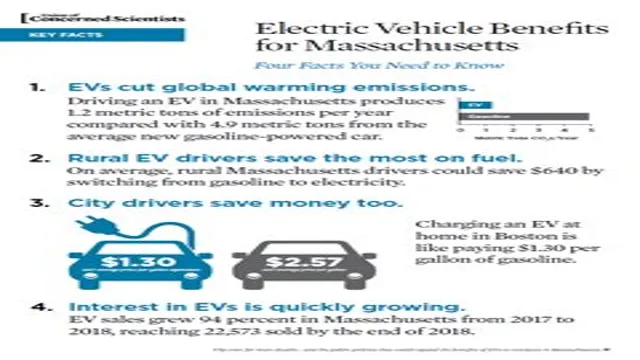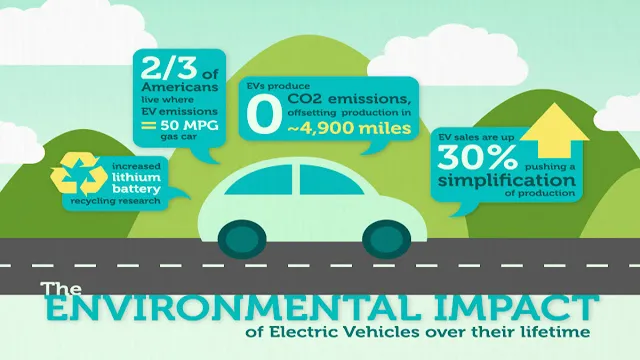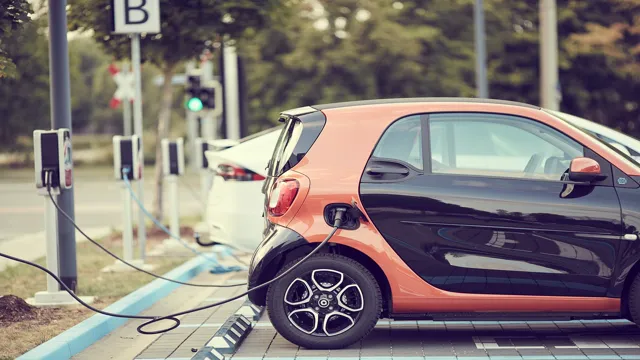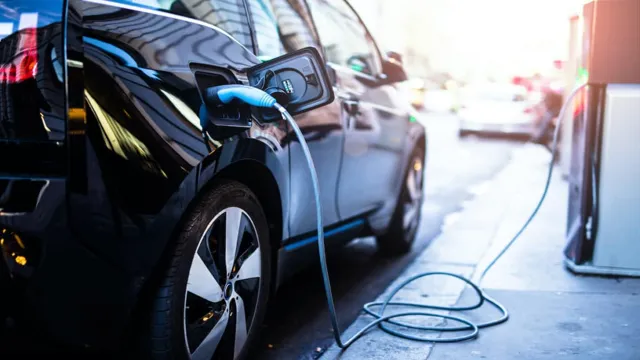Electric Cars: A Sustainable Solution for a Cleaner Environment
Electric cars are the future of mobility! Not only are they stylish and modern, but they’re also environmentally friendly, which is vital to reduce our carbon footprint. The modern world is experiencing the consequences of climate change such as higher sea levels, extreme weather patterns, and intensified natural disasters. It’s evident that our continued reliance on fossil fuels must end if we want to preserve our planet.
One of the significant benefits of electric cars is that they produce zero emissions, which means that they don’t contribute to air pollution. With every gasoline-powered car on the road, we’re releasing pollutants and toxins such as carbon dioxide, nitrogen oxides and sulfur oxides, which create smog and cause respiratory illnesses in humans. Electric cars simply use electricity from batteries, which converts it into power to move the wheels.
As a result, electric cars release no pollutants, which greatly reduces the air pollution problem. Furthermore, electric cars provide significant financial savings. Although electric cars’ initial cost is slightly higher than a traditional gasoline-powered vehicle, EVs are cost-effective in the long run.
Electric cars are cheaper to maintain than gasoline-powered cars because they use fewer moving parts and don’t require oil changes or other related services. Additionally, as electric car battery prices decrease over time, they’ll become more accessible for the average consumer. Moreover, electric cars are incredibly fast and quiet, which enhances the driving experience.
The instantaneous torque an electric motor delivers ensures quicker acceleration, making for a more enjoyable ride. Additionally, electric cars’ silent motors create an entirely different driving experience that is peaceful and relaxing for passengers and drivers alike. In conclusion, electric cars are not only modern and stylish but also environmentally friendly.
They produce zero emissions, financially savvy, enhance the driving experience, and are cheaper to maintain. With benefits like these, it’s no surprise that more and more people are switching to electric cars, ultimately leading to a cleaner and safer environment for future generations.
Reduced Carbon Footprint
Electric cars have really revolutionized the way we think about transportation. They offer numerous benefits and one of the biggest ones is their reduced carbon footprint. Electric cars run solely on electricity, and therefore release no harmful emissions into the environment.
This is a huge advantage over traditional gasoline-fueled cars, which release high levels of carbon dioxide and other harmful pollutants into the air. The use of electric cars leads to cleaner air and healthier environments, making them an excellent choice for environmentally conscious individuals. Furthermore, electric cars can be powered by renewable energy sources such as solar, wind and hydroelectric power, making them even greener.
By transitioning to electric vehicles, we can substantially reduce the carbon footprint of transportation, which is one of the leading causes of climate change. Let’s do our part in protecting our environment by opting for electric cars – it’s a win-win situation for both us and nature.
Less Emissions Than Gas Cars
One of the biggest advantages of electric cars is their ability to significantly reduce our carbon footprint. Traditional gas cars emit harmful pollutants that contribute to air pollution and climate change, but electric cars produce zero emissions at the tailpipe. Additionally, the electricity used to power electric cars can come from renewable sources like wind or solar, resulting in even fewer emissions.
When we choose electric cars over fossil fuel-powered vehicles, we are taking a step towards a cleaner, greener future. Not only do electric cars benefit the environment, but they also have the potential to save us money in the long run as we rely less on costly gas and oil. With the growing concerns over climate change, reducing our carbon footprint is more important than ever.
By switching to electric cars, we can make a positive impact on our planet and our wallets.

Carbon Offset Programs
Carbon offset programs have become increasingly popular in recent years as people look for ways to reduce their carbon footprint. These programs allow individuals or businesses to invest in projects that prevent or remove greenhouse gas emissions from the atmosphere, effectively neutralizing their own emissions. Examples of projects include reforestation, renewable energy development, and energy efficiency improvements.
By participating in these programs, you can take accountability for your carbon footprint and contribute to a more sustainable future. While carbon offset programs are not the only solution to climate change, they can be an effective way to reduce your overall impact on the environment. So, consider incorporating carbon offsets into your sustainability strategy to help reduce your carbon footprint and make a positive impact on the planet.
Cleaner Air and Health Benefits
One of the greatest benefits of electric cars is their positive impact on the environment. By using electricity as a power source, electric cars emit fewer pollutants and greenhouse gases than their gasoline-powered counterparts. This means that they help reduce harmful emissions, leading to cleaner air and a healthier planet.
In addition, electric cars also offer health benefits for humans. Since they do not emit harmful pollutants such as nitrogen oxides and volatile organic compounds, they can help reduce the risk of heart disease, asthma, and other respiratory illnesses. By choosing electric cars as our primary mode of transportation, we can take a step towards creating a cleaner, healthier world for ourselves and future generations.
Lower Pollution Exposure
Lowering pollution exposure can have significant health benefits, particularly in terms of cleaner air. Polluted air can be filled with toxic particles and gases, making it hazardous to breathe and leading to a variety of health problems, from asthma attacks to heart disease. By reducing pollution, we can decrease the risk of these health concerns and improve overall health outcomes.
Additionally, cleaner air can help to reduce the risk of environmental damage, such as acid rain and ozone depletion, which can have far-reaching effects on the planet. Taking steps to lower pollution exposure, such as using public transportation, walking or biking instead of driving, and supporting renewable energy sources, is not only beneficial for your own health but is essential for the health of the planet. By doing so, we can ensure a healthier and brighter future for ourselves and future generations.
Better Air Quality
With the current climate crisis, air pollution has become a growing concern globally. Poor air quality can lead to several health problems, including lung cancer, asthma, and heart disease. Fortunately, we can take steps to reduce air pollution and improve air quality.
By using public transportation, biking or walking, or driving a fuel-efficient car, we can decrease the number of cars on the road, thereby reducing the amount of exhaust they emit. Another way to reduce air pollution is to conserve energy by turning off lights and electronics and using energy-efficient appliances. Planting trees and supporting organizations that work towards cleaning up polluted areas is also an effective way to reduce pollution.
Cleaner air has several benefits, including fewer respiratory problems, lower risk of heart disease, and improved mental health. By taking steps towards better air quality, we can help improve our overall health and well-being while reducing our impact on the planet.
Reduced Noise Pollution
Reduced noise pollution is a great benefit of cleaner air and can have a huge impact on our daily lives. Noise pollution refers to any loud and unpleasant noise that disrupts one’s daily routine. It can come from sources like traffic, construction sites, or loud music from neighbors.
Prolonged exposure to such noise can cause hearing loss, heart problems, and even sleep disorders. With reduced noise levels, we can experience a more peaceful environment, which can lead to improved mental health and better sleep quality. Additionally, because less noise means less stress, we may see a reduction in blood pressure and a lowered risk of heart disease.
So, let’s all work to reduce noise pollution by using quieter vehicles, creating peaceful neighborhoods and communities, and advocating for well-planned and managed construction projects. By doing so, we can all enjoy the benefits of a quieter, healthier world.
Lower Operating Costs
One of the many benefits of electric cars is their lower operating costs. Unlike traditional gasoline-fueled cars, electric cars are powered by electricity, which is significantly cheaper than gasoline. Not only do electric cars reduce your fuel expenses, but they also have fewer moving parts than traditional cars, which means fewer repairs and maintenance costs.
EVs also have regenerative braking, meaning they generate electricity while braking to recharge the battery, reducing the need for brake replacements. In the long run, owning an electric car can save you a significant amount of money. Plus, with the environmental benefits that come with electric cars, it’s a win-win situation for both your wallet and the planet.
Lower Fuel Prices
Lower Fuel Prices Lower fuel prices can have a significant impact on operating costs for individuals and businesses. When fuel prices are low, it becomes more affordable to drive or operate vehicles, machinery, and equipment. This is particularly beneficial for businesses that rely heavily on transportation or use fuel-intensive machinery, such as construction companies or transport services.
Lower fuel costs can help businesses to increase profit margins, reduce operating expenses, and pass on savings to customers. In addition to benefiting businesses, lower fuel costs can also benefit individuals by reducing the cost of commuting and travel. It’s a win-win situation for everyone.
If you’re someone who’s constantly worried about the rising costs of fuel, then you can breathe a sigh of relief when prices drop. It can really ease the burden on your wallet and leave you with more money to invest or spend on other important things. So the next time you’re at the pump and notice a lower fuel price, take advantage and feel good about the savings you’re making.
Less Maintenance Costs
As a business owner, one of the biggest concerns you may have is keeping operational costs low. One way to achieve this is by investing in equipment and machinery that requires less maintenance and upkeep. By doing so, you can lower your overall operating costs, which can have a positive impact on your bottom line.
Not only will you save money on repairs and replacements, but you’ll also reduce downtime and minimize the potential for unexpected equipment failures. This means you won’t have to spend as much money on hiring contractors to fix problems or replacing broken parts and machinery. By minimizing maintenance costs, you can improve your company’s profitability and ensure that your business runs smoothly and efficiently.
A great example of this is investing in a car with a high-quality engine. While it may cost more upfront, a well-built car with a reliable engine will require less maintenance and repairs in the long run. This means you’ll save money on mechanic visits, oil changes, and other maintenance expenses.
Plus, you’ll have a more dependable vehicle that won’t unexpectedly break down and leave you stranded. The same principle applies to other types of equipment in your business, including HVAC systems, production machinery, and office equipment. By investing in higher-quality equipment that requires less maintenance, you’ll ultimately save money and time while ensuring your business operates as smoothly as possible.
In conclusion, reducing maintenance costs is essential for improving your company’s profitability and efficiency. By investing in equipment and machinery that requires less upkeep, you can save money on repairs and replacements while minimizing downtime. In the long run, this can help your business thrive and grow, making it well worth the initial investment.
So, if you’re looking to keep your operating costs low and maximize your profits, consider investing in equipment that requires less maintenance.
Government Incentives
In recent years, electric cars have become increasingly popular due to their significant environmental benefits. One of the ways governments around the world have encouraged the adoption of electric vehicles is by offering various incentives and subsidies. These incentives may include tax credits, grants, and rebates to lower the cost of purchasing an electric car.
Additionally, some cities offer free parking or exclusive driving lanes for electric car owners. These initiatives aim to reduce the carbon footprint of the transportation industry and improve air quality in cities. Moreover, lower fuel and maintenance costs for electric vehicles contribute to the financial benefits of owning and operating these cars over their lifetime.
Overall, government incentives have been instrumental in promoting the adoption of electric vehicles, and many countries have set ambitious goals to increase their electric vehicle market share in the coming years, thereby creating a more sustainable future for all.
Conclusion
In a world where the climate crisis has become a pressing concern, electric cars have emerged as a shining solution to offset the environmental damage caused by traditional gasoline vehicles. With their impressive energy efficiency and zero emissions, electric cars not only reduce carbon footprint but also offer a glimmer of hope for a sustainable future. So, if you’re looking to make a tangible impact on the environment while cruising on the roads, an electric car might just be the electrifying choice you make.
“
FAQs
How do electric cars benefit the environment?
Electric cars are known to benefit the environment by emitting significantly fewer pollutants and greenhouse gases than traditional gasoline-powered cars. This makes them a cleaner transportation option that contributes to reducing air pollution and the effects of climate change.
Are electric cars more expensive than traditional cars?
Generally, electric cars are more expensive than traditional cars due to the technology used in their production. However, over time they can be more cost-effective because of their fuel efficiency and the reduction in maintenance and repair associated with their design. Additionally, tax incentives and rebates from governments can help make purchasing electric cars more affordable.
What is the range of an electric car?
The range of an electric car depends on factors such as the model, battery capacity, and driving conditions. Currently, many electric cars can achieve a range of 200-300 miles on a single charge. However, advancements are being made to increase the range of electric cars to better meet the needs of drivers.
How long does it take to charge an electric car?
The time it takes to charge an electric car varies depending on the charging method used. For example, a Level 1 charging station can take up to 12 hours to fully charge a car battery, while a Level 2 charging station can take 4-6 hours. The fastest charging method is using a Level 3 charging station, which can provide an 80% charge in 30-45 minutes.



